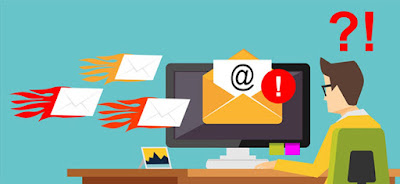WHAT IS EMAIL BOMBARDMENT?


It is always necessary to have a computer security protocol to face an infection by computer viruses, malware or whatever we want to call them. Many times, the fact that these phenomena occur reveals a poor security system in the company that must be corrected.
If we want to deal with virus infection problems on our
computer, we have to take a series of measures to act efficiently and quickly,
which of course will include the help of an expert. Here we show you some of
the things we recommend doing.
Protocol
for dealing with a computer virus infection:
1. Identify what the problem is and its magnitude. It is
not the same that a computer virus has infected files on the computer's system
that simply the antivirus
has blocked a Trojan.
2. Act quickly. Do not be dragging the virus problem, or
continue working with that computer. Quarantine it.
3. Inform users. You may have noticed the problem, but
the other people who use that computer have not. Inform other users that this
computer cannot be used temporarily.
4. Scan the computer with your antivirus, if you can.
There are computer viruses that can be removed with your antivirus. But at
other times, you may not be able to remove it, and the virus may even uninstall
or disable your protection. In any case, analyze it first to see what is there.
5. Call a computer expert. If you need a computer
technician to do a general cleaning of your PC, don't be afraid to do it. It is
better to solve the problem quickly than to waste days and days of work trying
to do it without success.
6. Use a replacement team. When you have computer
problems, it is essential to have other equipment available from which you can
access. In that sense, it is good that the sensitive information of the company
is in the cloud so that you can enter from anywhere.
7. Find out what was the origin of the malware. If the
malicious program has entered because one of the users was using the computer
doing operations that involve risk, we must take action so that it does not
happen again.
8. Learn from your mistakes. It is possible that you did
not have any antivirus installed on your PC and that has harmed you. Keep in
mind that now you must prevent malware problems in your company through a computer security
protocol.
9. Analyze the damage that has occurred. If irreparable
problems have occurred, a security system must be created to protect the
business. Data loss is corrected with a data redundancy system.
10. If necessary, report. In some cases, we are not
talking about computer viruses, but about spyware introduced by a criminal to
steal information from your company. In this case, you will need the help of a
computer expert to help you gather the evidence and trace the source of the
problem.
Do you follow these safety tips to face a virus infection
on your computer? What other measures do you recommend?
Comments
Post a Comment